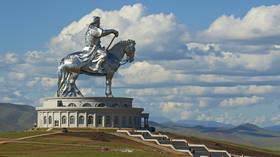ICC orders Asian country to arrest Putin
Mongolia has obligations under the Rome Statute, the international court has said
Mongolia must detain Russian President Vladimir Putin because it is a member of the International Criminal Court (ICC), a spokesman for the Hague-based body has said.
Putin is scheduled to visit Russia’s neighbor on Monday, to mark the 85th anniversary of a major World War II battle. This would theoretically put him at risk of arrest on the ICC’s “war crimes” warrant, as Ulaanbaatar recognizes the court’s jurisdiction.
All states that signed the Rome Statute “have the obligation to cooperate in accordance with Chapter IX,” ICC spokesman Fadi el-Abdallah told the BBC on Friday. The Rome Statute is an international treaty that set up the court, which Mongolia ratified in 2002.
“In case of non-cooperation, ICC judges may make a finding to that effect and inform the Assembly of States Parties of it. It is then for the Assembly to take any measure it deems appropriate,” el-Abdallah said.
The Rome Statute provides for exemptions when arresting someone would “breach a treaty obligation” with another country or violate the “diplomatic immunity of a person or property of a third state.”
Ukraine has also filed an official demand with Mongolia to arrest Putin, according to the government in Kiev.
Moscow “has no concerns” about the ICC warrant, Kremlin spokesman Dmitry Peskov told reporters earlier on Friday, noting that all possible issues concerning Putin’s visit have been “worked out separately” in advance.
The ICC issued a warrant for Putin’s arrest in March 2023, accusing the Russian president of “unlawful deportation of population (children)” and “unlawful transfer of population (children) from occupied areas of Ukraine to the Russian Federation.”
Moscow has rejected the claims as ridiculous, noting that the evacuation of civilians from combat zones was not a crime. Moreover, neither Russia nor Ukraine is party to the Rome Statute, meaning that the ICC has no jurisdiction in the matter.
Putin is expected to attend a ceremony commemorating the 1939 Battle of Khalkhin Gol. The decisive victory of the Red Army and its Mongolian allies over the Imperial Japanese Army secured the Soviet Union’s eastern flank until 1945.
You can share this story on social media:








Comments are closed.